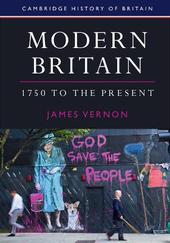
|
Modern Britain, 1750 to the Present
Paperback / softback
Main Details
| Title |
Modern Britain, 1750 to the Present
|
| Authors and Contributors |
By (author) James Vernon
|
| Series | Cambridge History of Britain |
|---|
| Physical Properties |
| Format:Paperback / softback | | Pages:588 | | Dimensions(mm): Height 246,Width 175 |
|
| Category/Genre | British and Irish History |
|---|
| ISBN/Barcode |
9781107686007
|
| Classifications | Dewey:941.07 |
|---|
| Audience | | Tertiary Education (US: College) | | Professional & Vocational | |
|---|
| Illustrations |
14 Maps; 77 Halftones, black and white; 7 Line drawings, black and white
|
|
Publishing Details |
| Publisher |
Cambridge University Press
|
| Imprint |
Cambridge University Press
|
| Publication Date |
20 April 2017 |
| Publication Country |
United Kingdom
|
Description
This wide-ranging introduction to the history of modern Britain extends from the eighteenth century to the present day. James Vernon's distinctive history is weaved around an account of the rise, fall and reinvention of liberal ideas of how markets, governments and empires should work. The history takes seriously the different experiences within the British Isles and the British Empire, and offers a global history of Britain. Instead of tracing how Britons made the modern world, Vernon shows how the world shaped the course of Britain's modern history. Richly illustrated with figures and maps, the book features textboxes (on particular people, places and sources), further reading guides, highlighted key terms and a glossary. A supplementary online package includes additional primary sources, discussion questions, and further reading suggestions, including useful links. This textbook is an essential resource for introductory courses on the history of modern Britain.
Author Biography
James Vernon is Professor of History at the University of California, Berkeley. He is the author of Politics and the People (1993), Hunger: A Modern History (2007) and Distant Strangers: How Britain Became Modern (2014), and the editor of Rereading the Constitution (1996), The Peculiarities of Liberal Modernity in Imperial Britain (2011) and the Berkeley Series in British Studies. He is also on the editorial boards of Social History, Twentieth Century British History, and the Journal of British Studies.
Reviews'Driven by an emphasis on the profound effects of free trade liberalism, James Vernon's Modern Britain covers vast ground. In lively and accessible prose he charts a coherent narrative of modern Britain attentive to the effects of the world beyond its shores. Vernon does not flinch from portraying the violence underpinning liberalism, and his insistence on writing Britain's history in a global frame is a welcome addition to the field.' Philippa Levine, University of Texas, Austin 'James Vernon's book is at once a powerful reinterpretation of British history and a compelling and comprehensive survey accessible to students from a diversity of backgrounds.' Chris Hilliard, University of Sydney 'What we have long waited for ... a beautifully written and illustrated textbook that deftly synthesizes several decades of new research to demonstrate how global forces created and recreated the polity we know as Modern Britain. Taking us on a lively journey that ends with an assessment of the Brexit vote, Vernon provides students and anyone interested in modern history with a fascinating portrait of how liberal political economy shaped the nation state and empire, society and urban life, the family and citizenship, and bodies and identities.' Erika Rappaport, University of California, Santa Barbara 'This is an outstandingly good book. The writing is excellent, crisp and concise, giving sufficient information and explanations of terms. The timelines are very useful, and biographies and sources reinforce the analysis in each chapter. The book is animated throughout by a tremendous analytical coherence and argumentative energy. This is likely to stand as the most up-to-date, interesting and usable textbook for modern Britain courses.' Robert Travers, Cornell University, New York 'This is a wonderful achievement by a historian at the peak of his abilities. Amidst a scholarship that has becoming increasingly specialised James Vernon has produced a powerful work of synthesis and reinterpretation, and he has done so in a clear and accessible manner. This is a textbook that will guide new students through the subject, but it offers too a powerful thesis about that nature of liberal political economy that will challenge all historians of the period to debate just how and when Britain became modern.' Matthew Hilton, Queen Mary University of London 'This book does an excellent job of weaving together the political, cultural, and social history of the period from 1750 to the present. Vernon consistently attacks some of the prevailing, complacent myths of British history, in particular in relation to the Empire ... [he] insists that Britain did not merely shape the world, but the world also shaped Britain, undermining nationalist accounts of British great power influence. One of the book's great strengths as a textbook is its political engagement ... it constructs a densely woven account of the political, social, and cultural history of Britain since 1975, placing Britain in its global context and remaining at all times politically engaged.' Florence Sutcliffe-Braithwaite, Twentieth Century British History 'This is an excellent new textbook which frames a narrative of British history since 1750 around the rise, fall and reinvention of liberal ideas about markets, governments and empires. It provides a timely re-assessment of modern Britain which will be of value to undergraduates. In an age in which a government minister (right-wing parliamentarian Jacob Rees-Mogg) can compose a self-congratulatory version of British history seen through the supposedly pivotal actions of various 'great white men' - and in which large numbers of the population of England have been enraptured by Brexit - James Vernon's warning that without a critical view of the past, we fall prey to the triumphalist and whitewashed versions of national history championed by politicians, is pertinent.' Charlie Lynch, Journal of Contemporary History
|